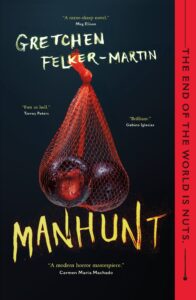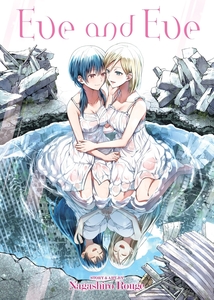Amazon Affiliate Link | Bookshop.org Affiliate Link
I knew going into Manhunt by Gretchen Felker-Martin that it was going to be a wild ride. The pair of bloody testicles suggested by the cover tells you that right off the bat. And to tell the truth, I’ve mostly gone off of apocalypse fiction the last few years – given the state of the real world – but I was intensely interested in a trans-centered apocalypse story, and requested that my library purchase it. A few marathon sessions – and some screeching at my book friends over messaging – later, and I had zero regrets and a lot of thoughts. Manhunt is a book of many bloody layers, all of them delightfully queer. The content warnings are numerous, but at its heart the story is in turns touching, funny, and cathartic, and if zombie apocalypse fiction is in your wheelhouse, you should give it a try.
I have decided, in the interest of article flow, to give the full list of content warnings at the end of this review. Please skip down to there if you have any doubts on the content, but in general Manhunt contains extreme amounts of violence, gore, and bigotry, with a little light cannibalism thrown in for flavor. *ahem* Set on the east coast of America, months after a deadly virus has swept the world and affected anyone with too much testosterone, the survivors struggle to stay alive amongst wandering packs of flesh-hungry zombies and the wreckage of civilization, as per standard fare in a zombie apocalypse.
The story centers Beth and Fran, two trans women who struggle to support themselves as hunters, only they do not hunt for food. They’re hunting feral men, so they can harvest their testicles and kidney lobes, which are, apparently, concentrated reserves of estrogen. They can eat the testicles themselves in a pinch, but their goal is to take them back to their friend Indi, who can refine the estrogen and sustain the community of people depending on it to not turn feral themselves, including trans women, non-binary people, and cis women with hormone disorders – anyone who would naturally have too much testosterone and be susceptible to the virus. (In the spirit of having a good time, I Did Not Question The Science of any of this, so you will have to do that research yourself.)
The main danger they face though is not the feral men, it’s the Legion, or the Sisterhood, or whatever any particular group calls itself – bands of cis women who took advantage of the apocalypse to go full bigot and declare the virus vengeance for thousands of years of rape and torture and the oppression of women etc etc. They’ve gone militant, with XX face tattoos and all the sisterly new traditions and womyn-centered vocabulary they can make up, and they consider anyone trans an unnatural danger rather than a person, a bomb waiting to go off that must be eliminated before it can harm more “real” women (although they too are concerned with estrogen extraction, so evidently they’re willing to go the distance to protect their cis-ters with hormone imbalances from the plague). Trapped between the Legion and the whims of rich person bunker towns, Beth, Fran, Indi, and their new friend Robbie, a trans man who has been living in the woods by himself since the virus hit, struggle not only to survive, but with how far they’re willing to go and what they’re willing to do for that survival and what sort of community they can build up from the rubble they’ve been left with.
What I found especially thrilling and interesting about Manhunt was the dichotomy of its story. On a surface level, it’s a very normal zombie apocalypse novel, albeit one that does not hide the violence. Every few pages someone starts fighting with a nail gun, or busts open a skull with a blunt instrument, or mentions brutal police state measures. There are stockpiles of food and supplies. People are innovative about how they reuse things. There are vague references to things on a global scale that Don’t Look Good. Things you can find in any apocalyptic wasteland story, almost comforting in their presence. But then also dotted throughout the story, sustaining its humanity, are these incredible moments between characters that speak to deeper experiences. Characters talk about the importance of building and sustaining community, specifically trans community. About the politics and futility of passing in the face of fascism and when it crosses the line into betraying your friends. What things you have to hold onto to be yourself and what things you’d be willing to compromise in order to survive. Whether it’s worth surviving if those things are taken away. And the characters are this wonderful hodge-podge of traumatized zombie apocalypse survivors. Trans and Cis. Woods-training or militaristic or civilian. Passing and not. Nonbinary, allies, willing to fight, wanting to hide, oblivious, terrible, trying their best. And they’re all, to a person, hot messes. Not one single person has their shit together. Everything they do with and to each other is messy, emotionally and physically. The sex isn’t always nice and affirming. Sometimes it’s about proximity or it’s transactional.
Beth and Fran, for example, start out in a relationship based on their friendship and their life in the wilds, but it is strained almost beyond bearing as they come into contact with both the Legion and with the bunker compound they take refuge in. Beth, unable to pass, finds herself pushed into more and more repugnant situations and is forced to decide what she’ll put up with for safety or whether she can be safe at all in a compound. Meanwhile, Fran, once she’s not solely around Beth on hunting trips, makes a series of sexual and relationship decisions based on how feminine they make her feel and what they can get for her long term. There is a lot of focus on the choices available to each character vs what each character is ultimately looking for in a relationship in the context of transness and the new World Without Testosterone. And I found it so refreshing to be thrown into this messy, gory world, to roll around in the blood and the dirt with these characters, and still get shown moments of community and pulling together. To let these characters be messy and hurtful but also be good and have fulfilling relationships. This book is entirely bloody, but not entirely grim.
In conclusion, you should not push yourself to read this book if you don’t like zombie apocalypse novels, or if violence or gore bother you. But if you want trans-centered horror that does not shy away from what it has to say, I implore you to give Manhunt a shot. Be ready to have a good time, to yell about it to other people, to laugh at the moments where the author was clearly like “this is my novel so I can have this moment if I want to.” It was grim and bloody but it was also joyous and cathartic in the writing. Give it a shot and have a good time with it.
Content warnings include: violence, gore, transphobia, TERFs, bigotry, cannibalism, death, executions, torture, rape, assault, dubious consent, indentured service, slavery, dehumanization, medical experimentation, eating disorders, body dysphoria, white feminism. I’m truly sorry if I’ve missed anything, but I think in general this covers it and gives the general tone of the novel. It’s not for those bothered by violence.


